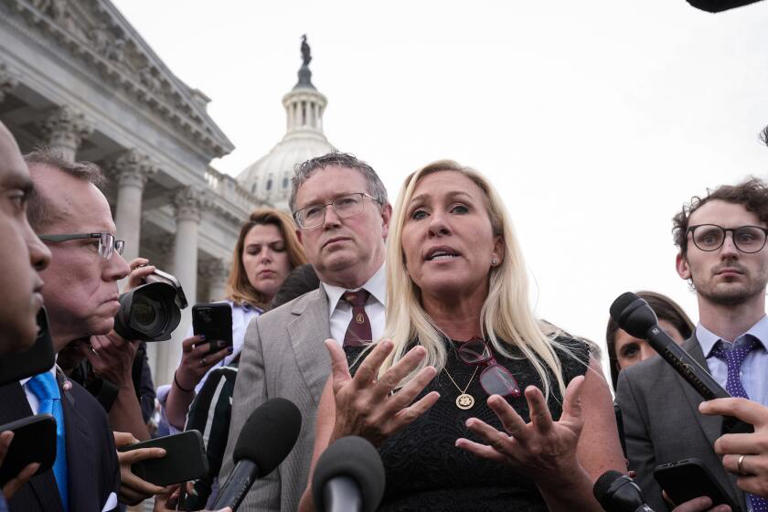“Marjorie Taylor Greene, Mike Johnson, Speaker of the House, U.S. Congress, political chaos, Republican Party, House of Representatives, Trump influence, political leadership, U.S. politics”
“Explore the dramatic attempt by Rep. Marjorie Taylor Greene to remove Speaker Mike Johnson, and the significant implications this event holds for the U.S. Congress. Understand the internal conflicts within the Republican Party and their impact on American political stability.”

In a riveting episode that underscores the ongoing tumult within the U.S. House of Representatives, Representative Marjorie Taylor Greene’s audacious bid to remove House Speaker Mike Johnson was met with a decisive rebuke, highlighting the political divide and the struggle for stability within American politics.
The Political Theater Unfolds
Representative Marjorie Taylor Greene, a controversial figure and staunch supporter of former President Donald Trump, initiated a bold maneuver to oust Speaker Mike Johnson. Standing on the floor of the House, Greene enumerated what she considered to be Johnson’s failures and missteps as Speaker, drawing vocal protests from her colleagues. Her move, though dramatic, was not unprecedented but it was unusual in its timing and intensity.
Greene’s critique of Johnson’s leadership as “pathetic, weak, and unacceptable” reflects a deep-seated frustration with what she perceives as ineffective leadership. However, the broader context of her actions points to a larger, more complex picture of intra-party conflicts and the challenges of maintaining coalition unity in a fragmented political landscape.
The Vote and Its Implications
The resolution to remove Johnson was swiftly countered by Republican Majority Leader Steve Scalise, who moved to table the motion. The resulting vote saw an overwhelming majority, with 359 representatives voting against Greene’s motion and only 43 supporting it. This decisive outcome not only kept Johnson in his position but also signaled a weary reluctance among many in both parties to continue engaging in what they see as destructive political infighting.
The vote’s significance extends beyond the immediate preservation of Johnson’s speakership. It illustrates the ongoing struggle within the Republican Party between its more traditional elements and the hardline, populist factions that have gained prominence in recent years. The fact that only 11 Republicans supported the motion—despite the higher number required to oust a previous speaker—points to a complex interplay of loyalty, political strategy, and the desire for stability.
The Role of Party Leaders and External Influences
Interestingly, the event also showcased the influence of external figures in shaping the dynamics within the House. Former President Trump, despite his support for Greene, advocated for tabling the motion. His stance likely reflects a strategic calculation about the timing and potential fallout of such a move in an election year.
Moreover, Speaker Johnson’s commitment to “being on the right side of history,” particularly in regards to international issues like U.S. support for Ukraine, highlights the geopolitical considerations that increasingly intersect with domestic political maneuvers. His ability to maintain his role amidst such a challenge speaks to his political acumen and the support he commands within the party’s more moderate and establishment wings.
Broader Political and Social Ramifications
The attempt to oust Johnson is not merely a story of political rivalry but a symptom of deeper issues within American governance. The frequent clashes within parties, the polarization of political discourse, and the challenges in addressing national and international issues through a fractured legislative lens are themes that this incident brings to the forefront.
As the U.S. approaches another election cycle, the repercussions of such internal conflicts are significant. They not only affect legislative productivity but also influence public perception of political institutions and their ability to govern effectively. For many, the spectacle of conflict detracts from the pressing issues facing the nation, from economic challenges to social justice concerns.
Conclusion
In summary, the failed effort to remove Speaker Mike Johnson from office is a microcosm of the larger challenges facing American politics today. While Greene’s actions reflect a factional approach to governance, the broader legislative response underscores a cautious, albeit strained, desire for stability and effective leadership. As the political landscape continues to evolve, the interplay of individual ambitions, party dynamics, and national interests will undoubtedly shape the future of U.S. political governance, making it a subject of keen interest and critical analysis.
Read More-